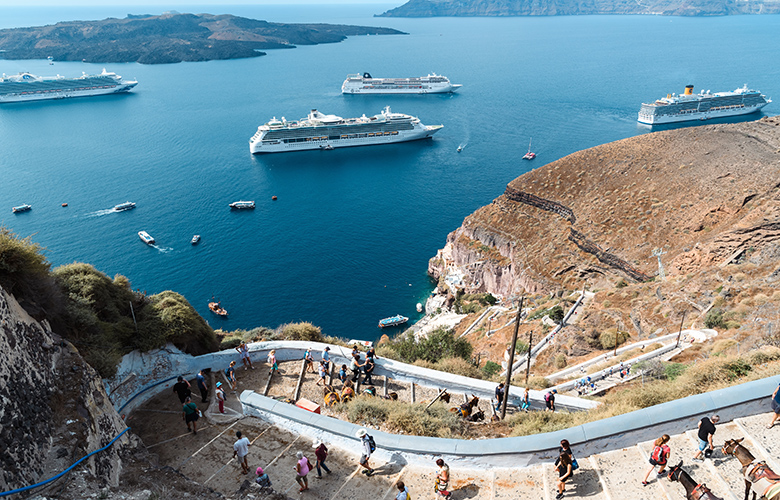The Minister of Tourism also announced an increase in the Climate Crisis Resilience Fee for hotels, rooms for rent, as well as short-term rental properties
The introduction of a new cruise fee for passengers disembarking in Greek ports, mainly in Mykonos and Santorini, was announced by the competent minister during the specification of measures to support entrepreneurship and business productivity in the primary sector, manufacturing and tourism Tourism Olga Kefalogianni.
Specifically, as he said, a cruise fee is being introduced, which will be increased for destinations that receive the most pressure, especially during the peak months, i.e. for Santorini and Mykonos, and lower for the rest of the ports, with escalation per time period. This is set at 20 euros per cruise passenger disembarking in Mykonos and Santorini. At the same time, for the rest of the country’s ports, it is set at 5 euros for the period June 1 to September 30, 40% reduced in the months of April to May and 80% reduced from the months of November and March. In total, the annual benefit is estimated at 50 million euros.
Part of this income will be registered in the budget of the Ministry of Tourism in order to improve the tourist infrastructure for the quality upgrade of the country’s tourism product. In addition, the Ministry of Tourism, in collaboration with the co-competent ministries – is working on a plan of arrangements and actions for the overall management of the cruise in our country.
In summary, the measure in question, as Olga Kefalogianni said, aims at the following:
– In the development of homeporting
– The development of infrastructure in the ports for the proper management of both berth allocation and for the control of flows on land.
– Incentives to attract smaller ships, with high income passengers – As well as a comprehensive study to assess the contribution of cruising to the economy and the footprint on local communities.
End of Climate Resilience
At the same time, Mr. Kefalogiannis proceeded to specify the measure for the end of Resilience, which as he said, the increase concerns the period from April to October, proportionately for hotels, rooms for rent, as well as short-term rental properties. As far as the durability fee is concerned, its increase is in total from 0.5 euros to 5 euros.
Specifically, from April to October, the increase for 1 and 2 star hotels is 0.5 euros and is set from 1.5 euros to 2 euros. The same applies to furnished rooms for rent. From 1.5 euros it goes to 2 euros every day.
In 3-star hotels, the increase is 2 euros and varies from 3 euros to 5 euros per day.
In 4-star hotels, the increase is 3 euros and varies from 7 euros to 10 euros per day.
In 5-star hotels and villas, the increase is 5 euros and varies from 10 euros to 15 euros per day.
At the same time, the period of validity of the reduced fee is extended by one month, and now also includes March. That is, the reduced fee is applied for five (5) months instead of the four that has been in effect until now. In the meantime, the specific income will be directed to costs of prevention and restoration of natural disasters, as well as improving infrastructure to support the country’s tourism product.
End of short-term leases
Finally, with regard to short-term leases, the following will apply:
In particular for smaller properties, the amount of the fee increases also for the low season, from 0.5 to 2 euros per daily use, while it increases to 8 euros per daily use during the months from April to October.
In addition, one more measure is taken: In the center of Athens, specifically in the 1st, 2nd and 3rd municipal districts, new short-term leases will not be allowed for one year, with the possibility of extending this measure.
Finally, the Ministry of Tourism is working on a framework plan regarding the establishment of functional specifications and corresponding safety specifications. The criterion is to ensure the quality of hospitality, and ultimately the quality of the tourist offer in our country, he pointed out.








